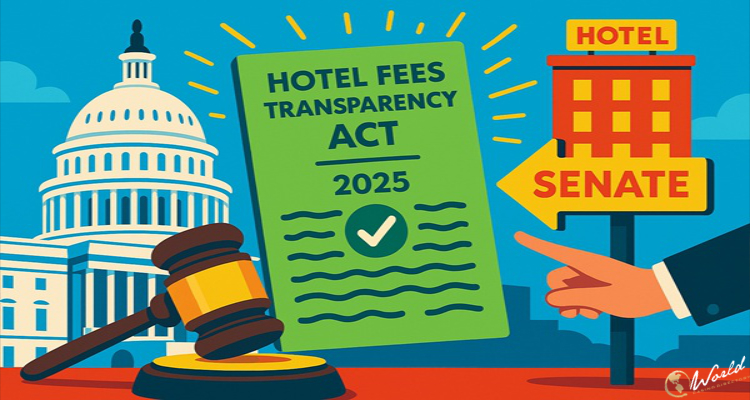The U.S. House of Representatives has taken a decisive step toward eliminating hidden costs in hotel bookings by passing the Hotel Fees Transparency Act of 2025 (H.R.1479). This bipartisan legislation would mandate all short-term lodging providers—hotels, resorts, and vacation rentals—to clearly display the full cost of a stay upfront. This includes not only the base price but also all mandatory fees, such as resort and destination charges, before a booking is finalized.
The bill received broad support in the House and passed via voice vote. It now advances to the Senate, where a corresponding version has already been introduced and awaits further deliberation. This legislative effort follows recent regulatory moves by the Federal Trade Commission (FTC) and executive actions aimed at curbing deceptive pricing practices across consumer sectors.
A Push for Industry-Wide Transparency
Frustration with “drip pricing”—the practice of advertising a low base rate only to tack on fees during checkout—has been growing among travelers. In places like Las Vegas, resort fees can range dramatically, from around $26 at smaller off-Strip hotels to nearly $57 at premier Strip resorts, significantly altering the total cost of a visit. These charges typically cover services like internet access, fitness center usage, and parking, which many guests assume are included in the nightly rate.
Industry stakeholders are largely on board with the proposed changes. Virginia Valentine, president and CEO of the Nevada Resort Association, emphasized the need for consistency across the board: “Our members already clearly and prominently disclose resort fees during the transaction to help guests make informed decisions,” she stated, according to Las Vegas Review-Journal. “We believe this requirement will level the playing field by including short-term rentals, OTAs and other online search sites.”
Nevada Leaders Back Bill as Tourism Measure
Nevada lawmakers have been vocal in their support of H.R. 1479 (pdf), particularly given the state’s reliance on the tourism industry. Sen. Catherine Cortez Masto, D-Nev., one of the Senate co-sponsors, highlighted the bill’s benefits for both consumers and the local economy: “Nevadans and visitors coming to Las Vegas deserve price transparency, and this common sense, bipartisan legislation will cut out hidden fees.”
Rep. Dina Titus, D-Las Vegas, whose district includes the Strip, echoed the sentiment. “During this critical time for the hospitality industry, we need to do everything we can to encourage tourism,” she said, calling the bill a “commonsense” solution that enhances clarity for consumers.
While Rep. Susie Lee, D-Nev., acknowledged that the impact on tourism rates might be minimal, she emphasized the bill’s core value: “It’s all about the transparency and keeping working families from getting nickeled and dimed.”
Reinforcing Federal Regulatory Efforts
The legislation aligns closely with regulatory efforts already underway. In December 2024, the FTC issued a rule requiring upfront fee disclosures by hotels, vacation rentals, and event ticketing platforms, with enforcement set to begin on May 10, 2025. Then-FTC Chair Lina Khan remarked that this move could save Americans billions of dollars and millions of hours lost navigating opaque pricing structures.
However, with leadership changes at the FTC, including Andrew Ferguson’s appointment as chair under President Donald Trump, the rule’s enforcement future remains somewhat uncertain. Ferguson, the lone dissenter in the FTC’s December vote, noted procedural concerns rather than the substance of the rule, stating, “the time for rulemaking by the Biden-Harris FTC is over.”
Passing the Hotel Fees Transparency Act into law would solidify the FTC’s policy through congressional backing, ensuring long-term enforcement regardless of agency leadership shifts.
Industry Associations Applaud Standardization
The bill has garnered support from both hotel operators and online booking platforms. The American Hotel and Lodging Association and the Travel Technology Association—representing major travel aggregators such as Kayak and Booking.com—have endorsed the bill for creating a uniform standard.
“This bill and its Senate companion … set one national standard on what constitutes a ‘total service price’ and how it must be displayed,” a representative of the Travel Technology Association stated, emphasizing the consumer benefit of consistent pricing information across platforms.
Support for the legislation extends to state tourism boards, which view it as a way to restore confidence and streamline travel planning. By removing ambiguity from advertised prices, destinations hope to attract more visitors and reduce consumer frustration.
Closing Gaps in Hotel Pricing Practices
If enacted, the Hotel Fees Transparency Act would apply to all forms of lodging advertising, including hotel websites, third-party platforms, and promotional materials across print, TV, and digital channels. The mandate covers all mandatory charges: room rates, resort and destination fees, cleaning charges for rentals, and amenities like Wi-Fi or gym access. Optional extras, such as minibar purchases or premium TV, would be excluded unless bundled into a mandatory package.
The legislation aims to put an end to the misleading practice of advertising artificially low prices, only for customers to be surprised by fees during checkout. By requiring that the full cost be visible from the outset, the bill supports more honest marketing and enables travelers to make fair comparisons.
As Rep. Mark Amodei, R-Nev., succinctly put it: “Transparency is key, and being upfront about costs is good for guests, good for business, and especially important in a tourism-driven state like Nevada.”


